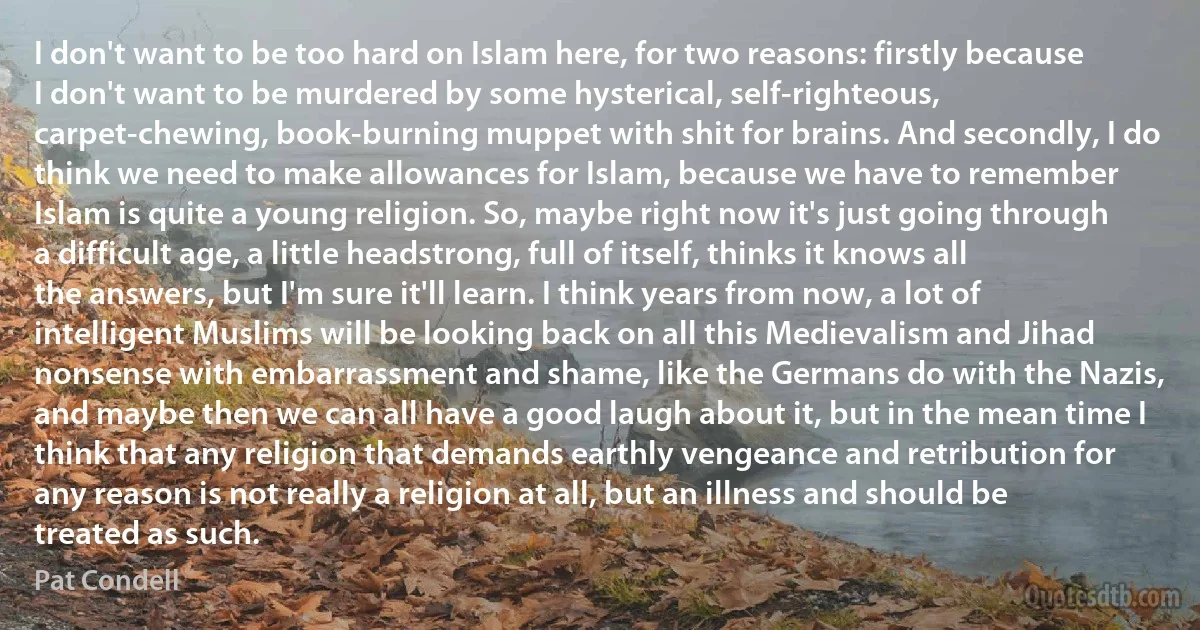
I don't want to be too hard on Islam here, for two reasons: firstly because I don't want to be murdered by some hysterical, self-righteous, carpet-chewing, book-burning muppet with shit for brains. And secondly, I do think we need to make allowances for Islam, because we have to remember Islam is quite a young religion. So, maybe right now it's just going through a difficult age, a little headstrong, full of itself, thinks it knows all the answers, but I'm sure it'll learn. I think years from now, a lot of intelligent Muslims will be looking back on all this Medievalism and Jihad nonsense with embarrassment and shame, like the Germans do with the Nazis, and maybe then we can all have a good laugh about it, but in the mean time I think that any religion that demands earthly vengeance and retribution for any reason is not really a religion at all, but an illness and should be treated as such.
Pat CondellRelated topics
age embarrassment full good hard illness islam laugh learn looking mean need now quite reason religion right should shame sure think time vengeance young years shit jihad brains muppetRelated quotes
The proof of the pudding is in the eating. There was a widespread myth of the 1970s, a myth along Tom Kuhn's (1962) Structure of Scientific Revolutions lines. The Keynesianism, which worked so well in Camelot and brought forth a long epoch of price-level stability with good Q growth and nearly full employment, gave way to a new and quite different macro view after 1966. A new paradigm, monistic monetarism, so the tale narrates, gave a better fit. And therefore King Keynes lost self esteem and public esteem. The King is dead. Long live King Milton!
Contemplate the true facts. Examine 10 prominent best forecasting models 1950 to 1980: Wharton, Townsend–Greenspan, Michigan Model, St. Louis Reserve Bank, Citibank Economic Department under Walter Wriston's choice of Lief Olson, et cetera. ... M did matter as for almost everyone. But never did M alone matter systemically, as post-1950 Friedman monetarism professed.

Paul Samuelson
Islam's money and muscle power may look impressive, certainly capable of doing some real damage to targeted countries and societies, but Islam has no chance of becoming the religion of a science-based, space-conquering world society. Exclusivist revelations have no appeal among educated people, especially after they have acquainted themselves with the Vedantic or Buddhist philosophies. That is why the Churches are investing huge resources in the battle for Asia's mind, where they face their most formidable enemy. That is why they are so active in India: not only is India's atmosphere of religious freedom more hospitable to them than the conditions of Islamic countries, or even of non-Islamic countries where proselytization is prohibited (countries as divergent as China, Myanmar, Israel, and, at least formally, Nepal); but they also know and fear the intrinsic superiority of the Indian religion.

Koenraad Elst
Reading conventional notions of class struggle and anti-colonialism into bin Laden, the Taliban, and radical Islam is not just solipsistic. It is nonsense. If poverty and destitution, colonialism and capitalism are animating radical Islam, explain this: In March, the Taliban went to the Afghan desert where stood great monuments of human culture, two massive Buddhas carved out of a cliff. At first, Taliban soldiers tried artillery. The 1,500-year-old masterpieces proved too hardy. The Taliban had to resort to dynamite. They blew the statues to bits, then slaughtered 100 cows in atonement-for having taken so long to finish the job. Buddhism is hardly a representative of the West. It is hardly a cause of poverty and destitution. It is hardly a symbol of colonialism. No. The statues represented two things: an alternative faith and a great work of civilization. To the Taliban, the presence of both was intolerable.

Charles Krauthammer
Do you know what I think of history? ... For a while I thought history was something that bitter old men wrote. But Jack loved history so... No one'll ever know everything about Jack. But ... history made Jack what he was ... this lonely, little sick boy ... scarlet fever ... this little boy sick so much of the time, reading in bed, reading history ... reading the Knights of the Round Table ... and he just liked that last song.
Then I thought, for Jack history was full of heroes. And if it made him this way, if it made him see the heroes, maybe other little boys will see. Men are such a combination of good and bad ... He was such a simple man. But he was so complex, too. Jack had this hero idea of history, the idealistic view, but then he had that other side, the pragmatic side... his friends were all his old friends; he loved his Irish Mafia.

Jacqueline Kennedy Onassis
Moreover, if we believe, as I do, that God's grace is extended to those who die in infancy or as small children, the death of these children was actually their salvation. We are so wedded to an earthly, naturalistic perspective that we forget that those who die are happy to quit this earth for heaven's incomparable joy. Therefore, God does these children no wrong in taking their lives.
So whom does God wrong in commanding the destruction of the Canaanites? Not the Canaanite adults, for they were corrupt and deserving of judgment. Not the children, for they inherit eternal life. So who is wronged? Ironically, I think the most difficult part of this whole debate is the apparent wrong done to the Israeli soldiers themselves. Can you imagine what it would be like to have to break into some house and kill a terrified woman and her children? The brutalising effect on these Israeli soldiers is disturbing.

William Lane Craig
